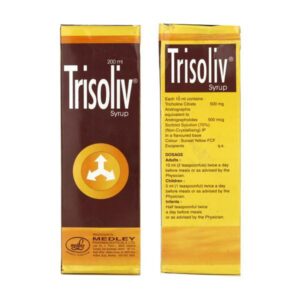SORBITOL + TRICHOLINE CITRATE + ANDROGRAPHIS PANICULATA
Sorbitol: Drug Name: Sorbitol
Use: Sorbitol is a sugar substitute commonly used in the food industry as a sweetener. In the medical field, it is also used as a laxative to treat constipation.
Mechanism of Action: Sorbitol works by drawing water into the intestines, which helps soften the stool and stimulate bowel movements. It is not absorbed into the bloodstream and passes through the digestive system relatively unchanged.
Dose: The dosage of sorbitol for laxative use varies depending on the individual and the severity of constipation. It is typically taken orally and comes in various forms, including liquid solution or oral suspension. It is important to follow the instructions provided by a healthcare professional or read the product label for proper dosage information.
Side Effects: Sorbitol is generally considered safe when used as a laxative, but it may cause some side effects. These can include abdominal cramps, bloating, flatulence, diarrhea, and increased thirst. These side effects are usually temporary and subside once the laxative effect has passed. If any severe or persistent side effects occur, it is essential to seek medical attention.
It is worth noting that certain individuals may be more sensitive to the laxative effects of sorbitol, especially those with irritable bowel syndrome (IBS) or other digestive disorders. In these cases, lower doses or alternative treatments may be recommended.
Overall, Sorbitol is an effective laxative used to treat constipation, but it is important to use it as directed and consult a healthcare professional before starting any new medication or treatment.
Tricholine Citrate: Tricholine Citrate is a drug that falls under the category of hepatoprotective agents. It is primarily used for the treatment of liver disorders, where it helps to restore and maintain liver function. This drug is commonly prescribed to patients with hepatic dysfunction, fatty liver, and those who have undergone liver surgeries.
The mechanism of action of Tricholine Citrate involves the stimulation of the synthesis and secretion of bile, which in turn helps to improve digestion and the absorption of fats. Additionally, it acts as a lipotropic agent, meaning it helps to prevent the accumulation of fats in the liver and facilitates their metabolism. Tricholine Citrate also promotes the regeneration of liver cells, aiding in the recovery and normalization of liver function.
The usual recommended dose of Tricholine Citrate is 1-2 tablets three times a day, taken after meals. However, the specific dosage may vary depending on the severity of the liver disorder and the patient’s response to treatment. It is important to follow the prescribed dose and instructions provided by the healthcare professional.
As with any medication, Tricholine Citrate may have some side effects. Common side effects include nausea, vomiting, diarrhea, and abdominal discomfort. These side effects are usually mild and temporary. However, if any severe or persistent side effects are experienced, it is important to seek medical attention.
It is worth noting that Tricholine Citrate should be used with caution in patients with kidney disorders. Additionally, it is important to inform the healthcare professional about any other medications or supplements being taken, as drug interactions may occur.
It is always important to consult with a healthcare professional before starting or making changes to any medication regimen, including Tricholine Citrate. They can provide the appropriate information and guidance based on an individual’s specific condition and medical history.
Andrographis Paniculata: Andrographis Paniculata, also known as “King of Bitters,” is an herb native to Southeast Asia and India. It has been used in traditional medicine for centuries due to its various health benefits.
The main use of Andrographis Paniculata is as an herbal medicine to boost immunity and provide relief from common cold, cough, and flu symptoms. It is also used for its anti-inflammatory, antioxidant, and anti-microbial properties. Some studies suggest that it may also have antiviral activity against certain viruses, including the flu virus.
The primary active components in Andrographis Paniculata are andrographolides. They work by modulating the immune system and reducing inflammation. The exact mechanism of action is not fully understood, but it is believed that the herb stimulates the production of immune cells and enhances their activity against pathogens.
The recommended dose of Andrographis Paniculata extract can vary depending on the specific product and the condition being treated. However, typical adult doses range from 300 to 600 milligrams per day, divided into two or three doses. It is usually taken orally in the form of capsules, tablets, or liquid extracts. It is advisable to follow the instructions provided by the manufacturer or consult a healthcare professional for the appropriate dosage.
As with any medication or herbal supplement, Andrographis Paniculata can have side effects. Some common side effects reported include digestive issues such as stomach discomfort, nausea, diarrhea, and loss of appetite. Additionally, it may cause allergic reactions in some individuals, leading to symptoms such as rash, itching, and difficulty breathing. It is recommended to discontinue use and seek medical attention if any severe or persistent side effects occur.
It is important to note that Andrographis Paniculata may interact with certain medications, so it is recommended to consult a healthcare professional before starting its use, especially if you have any underlying medical conditions or are taking other medications. Pregnant and breastfeeding women should also exercise caution and consult a healthcare provider before using Andrographis Paniculata.

